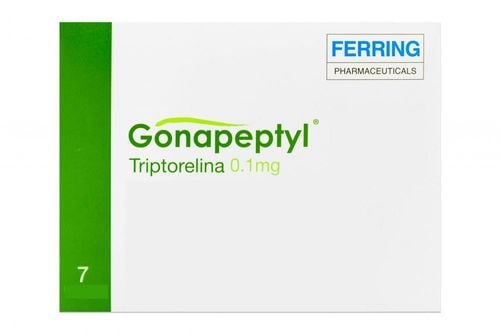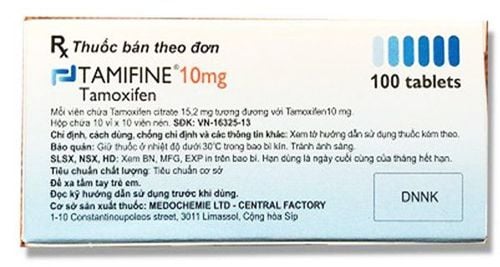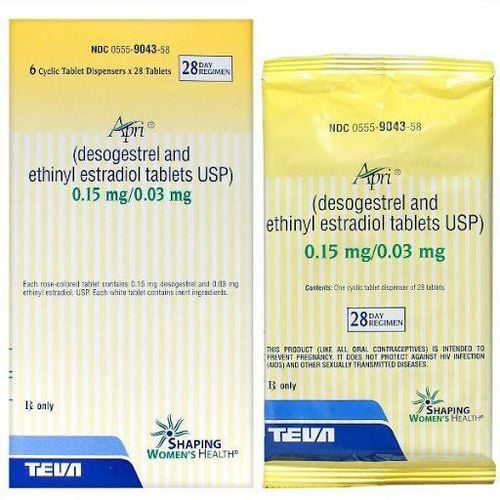This is an automatically translated article.
Antagon is an injection under the skin, used to support hormone regulation and treat infertility in women. Antogan injections may have some potential side effects during use, so patients need to be cautious and strictly follow the doctor's instructions, avoid self-injecting or adjusting the dose.
1. What is Antagon?
Antagon (ganirelix) belongs to a class of drugs called gonadotropin-releasing hormone antagonists and is available as a solution for subcutaneous injection. Antagon is a man-made protein that reduces the amount of hormones in the body, including the female sex hormone estrogen. Your doctor may prescribe Antagon with other medications to help women regulate hormones during infertility treatment.2. Indications and uses of Antagon
Antagon (ganirelix) injection is indicated for use as an aid in fertility to help prevent an increase in luteinizing hormone (LH) or ovulation in women undergoing fertility treatment with controlled ovarian stimulation. In addition, Antagon is also used to reduce the need for follicle-stimulating hormone (FSH) - a hormone necessary for ovulation in women. In addition, Antagon also serves as a gonadotropin-releasing hormone (GnRH) agonist.
3. Dosage and how to use Antagon
3.1. Dosage of Antagon injection Antagon dose will be prescribed differently for each specific patient. Antagon subcutaneous dose will be determined based on the strength of the drug. In addition, the frequency of use and the time between doses are also prescribed by the doctor after assessing the patient's health condition.
For injectable Antagon tablets for the treatment of female infertility, the recommended doses are given below:
Adults: After FSH treatment on the second or third day of the menstrual cycle, the patient will be subcutaneous injection 250mcg ganirelix/time/day during mid-late follicular phase (approximately day 7 or 8 - day 12 or 13 of the menstrual cycle). Children: Antagon subcutaneous injection is not recommended for children. 3.2. How to use Antagon injection To use Antagon safely and effectively, you should understand how and when to use it. Ideally, patients should consult detailed advice from their doctor, and carefully read the instructions for using Antagon medicine properly. In certain cases, Antagon can be injected at home, but the patient should note the following:
Understand and apply the correct method of drug preparation to ensure safety. Wash your hands with soap and clean water before administering the injection. Patients should be sure to understand and carefully follow their doctor's instructions when injecting themselves, including the use of appropriate syringes and needles. Avoid injecting less or more than the amount of Antagon prescribed by your doctor. Avoid injecting into places that are not recommended to prevent the risk of developing skin problems. Throw away unused syringes, needles, bottles, and medications until after the injection as directed by your doctor. Tell your doctor about the last dose of Antagon (ganirelix) you took. Your doctor may recommend human chorionic gonadotropin (hCG) or adjust your dose at the appropriate time.
4. What should be noted when using Antagon?
Before and during the use of Antagon, patients need to consult a doctor to specifically assess the risks and benefits that the drug brings. For Antagon subcutaneous injection, there are a few things you need to keep in mind:
Avoid taking Antagon if you are allergic to the active ingredient in it or to similar drugs such as goserelin (Zoladex), leuprolide (Lupron, Lupron). Eligard) or nafarelin (Synarel). The needle cap of the syringe pre-filled with dry natural rubber - a derivative of latex, which has the potential to cause allergic reactions in people who are sensitive to rubber. Therefore, you need to tell your doctor if you have a history of allergy to latex. Antagon can cause serious allergic reactions, including anaphylaxis. If you notice symptoms such as itching, rash, difficulty swallowing, difficulty breathing or swelling of the mouth/tongue,... get medical help and attention as soon as possible. Antagon is classified as an X by the FDA for pregnancy, so it can harm an unborn baby or increase the risk of birth defects. Therefore, Antagon should not be used by pregnant women. The doctor may ask the patient to take a pregnancy test before injecting the drug to ensure it is safe for women who are suspected of being pregnant. Since there are no specific data on whether Antagon passes into breast milk, nursing mothers should not be treated with this medicine. During treatment with Antagon, patients need to have regular blood tests and physical exams. Some women using Antagon injection have developed ovarian hyperstimulation syndrome (OHSS), especially after the first cycle of treatment. This syndrome can be life-threatening, so tell your doctor right away if you have any of the following symptoms: Pelvic pain, severe stomach pain, unusual swelling, weight gain, diarrhea , trouble breathing, nausea, vomiting, or urinating less than usual. Discontinue Antagon at the onset of severe abdominal pain. In addition, avoid injections of human chorionic gonadotropin (hCG) as well as sexual intercourse during treatment with Antagon.
5. Some side effects of Antagon
During treatment with Antagon, patients may experience some of the following side effects:
Stomach pain, abdominal pain, flatulence or diarrhea. Rapid weight gain. Difficulty swallowing, cough, dizziness, heart palpitations, shortness of breath. Swelling of the eyelids, around the eyes, tongue, lips, or face. Rash, itchy rash on the skin. Chest tightness, fatigue or unusual weakness. Headache, swelling and pain at the injection site. When noticing any reaction after injecting Antagon, the patient should immediately notify the doctor for assistance. Some side effects may go away on their own during treatment as the patient's body adapts to the medication. In addition, your doctor may also recommend ways to help prevent or minimize some of these side effects.
6. Antagon drug interacts with which drugs?
Some drugs when used with Antagon can cause interactions, so patients need to inform their doctor about any drugs or substances they are taking. These medications may include over-the-counter medications, dietary supplements, or vitamin supplements. If medications are necessary, your doctor may recommend a dose adjustment or other interaction precautions.
7. Instructions for storing Antagon
Antagon medicine is prepared in the form of a solution, which needs to be stored in the original manufacturer's sealed vial and packaging. The ideal storage condition of Antagon is room temperature, not exceeding 30 degrees and placed in a cool, dry location, avoiding exposure to sunlight. In addition, you should also avoid storing the medicine in a humid place such as the bathroom because it is easy to grow bacteria, affecting the quality of the medicine.
Antagon is not recommended for use in children, can be harmful if exposed to. Therefore, you need to keep the medicine out of the reach of children or pets.
Please dial HOTLINE for more information or register for an appointment HERE. Download MyVinmec app to make appointments faster and to manage your bookings easily.













